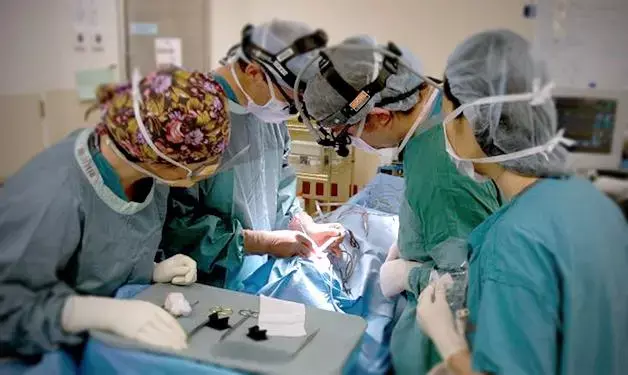- Home
- Medical news & Guidelines
- Anesthesiology
- Cardiology and CTVS
- Critical Care
- Dentistry
- Dermatology
- Diabetes and Endocrinology
- ENT
- Gastroenterology
- Medicine
- Nephrology
- Neurology
- Obstretics-Gynaecology
- Oncology
- Ophthalmology
- Orthopaedics
- Pediatrics-Neonatology
- Psychiatry
- Pulmonology
- Radiology
- Surgery
- Urology
- Laboratory Medicine
- Diet
- Nursing
- Paramedical
- Physiotherapy
- Health news
- Fact Check
- Bone Health Fact Check
- Brain Health Fact Check
- Cancer Related Fact Check
- Child Care Fact Check
- Dental and oral health fact check
- Diabetes and metabolic health fact check
- Diet and Nutrition Fact Check
- Eye and ENT Care Fact Check
- Fitness fact check
- Gut health fact check
- Heart health fact check
- Kidney health fact check
- Medical education fact check
- Men's health fact check
- Respiratory fact check
- Skin and hair care fact check
- Vaccine and Immunization fact check
- Women's health fact check
- AYUSH
- State News
- Andaman and Nicobar Islands
- Andhra Pradesh
- Arunachal Pradesh
- Assam
- Bihar
- Chandigarh
- Chattisgarh
- Dadra and Nagar Haveli
- Daman and Diu
- Delhi
- Goa
- Gujarat
- Haryana
- Himachal Pradesh
- Jammu & Kashmir
- Jharkhand
- Karnataka
- Kerala
- Ladakh
- Lakshadweep
- Madhya Pradesh
- Maharashtra
- Manipur
- Meghalaya
- Mizoram
- Nagaland
- Odisha
- Puducherry
- Punjab
- Rajasthan
- Sikkim
- Tamil Nadu
- Telangana
- Tripura
- Uttar Pradesh
- Uttrakhand
- West Bengal
- Medical Education
- Industry
Perioperative care may reduce death after surgery in Low middle income countries

Cancer prevalence and its associated mortality are increasing in low-income and middle-income countries (LMICs). In a recent study, researchers have found higher levels of mortality after cancer surgery in LMICs than in Upper middle-income countries (UMIC). They noted that the mortality rate is not fully explained by stages of the disease and recommend policies that strengthen perioperative care systems. The research has been published in the journal THE LANCET on January 21, 2021.
The authors wrote, "Rescuing patients who sustain a major complication from dying has become an important focus of quality improvement in surgery. Not only must complications be minimised, but the timely recognition and management of complications are essential if avoidable mortality is to be minimised". However, there is insufficient high-quality data about factors contributing to early death and complications after cancer surgery in LMICs. To address these issues, researchers conducted a study to determine the variation in mortality and complication rates for breast, colorectal, and gastric cancers in low-income, middle-income, and high-income countries.
It was a multicentre, international prospective cohort study of consecutive adult patients undergoing surgery for primary breast, colorectal, or gastric cancer requiring a skin incision done under general or neuraxial anaesthesia. They included 15 958 patients from 428 hospitals in 82 countries (high income 9106 patients, 31 countries; upper-middle-income 2721 patients, 23 countries; or lower-middle-income 4131 patients, 28 countries) between April 1, 2018, and Jan 31, 2019. The major outcome assessed was death or major complication within 30 days of surgery.
Key findings of the study were:
• Upon analysis, researchers found that the patients in LMICs presented with more advanced disease, compared with patients in high-income countries.
• They also found that the 30-day mortality was higher for gastric cancer in low-income or lower-middle-income countries (adjusted odds ratio 3·72) and for colorectal cancer in low-income or lower-middle-income countries (4·59) and upper-middle-income countries (2·06). However, they observed no difference in 30-day mortality in breast cancer.
• They found that the proportion of patients who died after a major complication was high in low-income or lower-middle-income countries (6·15, 3·26–11·59) and upper-middle-income countries (3·89, 2·08–7·29).
• They noted that the postoperative death after complications was partly explained by patient factors (60%) and partly by hospital or country (40%).
• They mentioned, "the absence of consistently available postoperative care facilities was associated with seven to 10 more deaths per 100 major complications in LMICs."
The authors concluded, "Higher levels of mortality after cancer surgery in LMICs was not fully explained by later presentation of disease. The capacity to rescue patients from surgical complications is a tangible opportunity for meaningful intervention."
For further information:
https://www.thelancet.com/journals/lancet/article/PIIS0140-6736(21)00001-5/fulltext
Medical Dialogues Bureau consists of a team of passionate medical/scientific writers, led by doctors and healthcare researchers. Our team efforts to bring you updated and timely news about the important happenings of the medical and healthcare sector. Our editorial team can be reached at editorial@medicaldialogues.in.
Dr Kamal Kant Kohli-MBBS, DTCD- a chest specialist with more than 30 years of practice and a flair for writing clinical articles, Dr Kamal Kant Kohli joined Medical Dialogues as a Chief Editor of Medical News. Besides writing articles, as an editor, he proofreads and verifies all the medical content published on Medical Dialogues including those coming from journals, studies,medical conferences,guidelines etc. Email: drkohli@medicaldialogues.in. Contact no. 011-43720751


